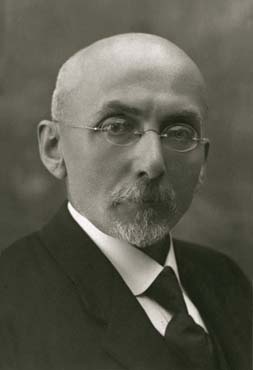Otokar Březina facts for kids
Otokar Březina (born Václav Jebavý, 13 September 1868 – 25 March 1929) was a famous Czech poet and essay writer. Many people think he was the most important Czech Symbolist poet. Symbolism was a special art movement where artists used symbols and ideas to express feelings and deeper meanings, rather than just showing things as they are.
Quick facts for kids
Otokar Březina
|
|
|---|---|
 |
|
| Born | 13 September 1868 Počátky |
| Died | 25 March 1929 Jaroměřice nad Rokytnou |
| Resting place | Cemetery in Jaroměřice nad Rokytnou |
| Partner(s) | Emilie Lakomá |
Early Life and Inspiration
Březina was born in a small town called Počátky. He found a lot of inspiration from the mysterious landscape of the Vysočina Region, which is a hilly area in the Czech Republic. He lived there his whole life.
Most of his famous works were written over 13 years while he worked as a teacher. He taught in Nová Říše, a small town with a monastery. He often visited the monastery's large library. There, he studied many books by medieval philosophers, especially German and French mystics. This helped him cope after both his parents died suddenly.
Around 1895, Březina started thinking deeply about the meaning of life. He wrote his first book of poems, Tajemné dálky (which means "Mysterious Ranges"). In this book, he wrote about feeling separated from the outside world and finding comfort in art.
Poetic Journey
In his second book, Svítání na západě (meaning "Sunrise in the West"), published in 1896, Březina explored the idea that pain can help us understand things better. He also believed that death was a key to understanding life's mysteries.
His third book, Větry od pólů ("Winds from the Poles"), came out in 1897. In this work, he started to focus less on his own pain and more on how all humans are connected. He also tried to feel like he was part of the universe's energy. This feeling of belonging to "Everything" became even stronger in his next book, Stavitelé chrámu ("Builders of the Temple"). In this book, he praised clever and creative people as those who help society grow.
His last book of poems, Ruce ("Hands"), published in 1901, showed his ideas at their peak. He imagined a magical chain formed by all hands working together to build the world around us. Březina also started a sixth book of poems called Země ("Earth"), but he never finished it.
Writing Style and Influence
Březina's poems were full of rich metaphors and parables. He used religious ideas, philosophical terms, and even scientific words. His style changed over time, moving from rhythmic verses to broader free verse. His poems were full of vivid images, deep thoughts, and a musical feel.
His books of essays are also an important part of his work. He wrote many letters, which help us understand his creative process and his ideas. Březina was also known for his friendships with other important Czech artists and thinkers. These included the sculptor František Bílek, the writer and priest Jakub Deml, and the philosopher Ladislav Klíma.
Otokar Březina passed away in Jaroměřice nad Rokytnou. Many books and studies have been written about him. His unique and inspiring poetry had a big influence on many modern Czech poets.
Works
- Tajemné dálky ("Mysterious Ranges") – 1895, poems
- Svítání na západě ("Sunrise in the West") – 1896, poems
- Větry od pólů ("Winds from the Poles") – 1897, poems
- Stavitelé chrámu ("Builders of the Temple") – 1899, poems
- Ruce ("Hands") – 1901, poems
- Hudba pramenů ("Music of the Springs") – 1903, essays
- Skryté dějiny ("Hidden History") – essays (published after he died). An English version was published in 1997.
See also
 In Spanish: Otokar Březina para niños
In Spanish: Otokar Březina para niños
 | Selma Burke |
 | Pauline Powell Burns |
 | Frederick J. Brown |
 | Robert Blackburn |

